11 Superfoods for Menopause
If you’re looking to reduce the symptoms of menopause, superfoods can help. These foods are packed with nutrients that can help improve your overall health and ease your symptoms.
Table of Contents
ToggleIn this blog post, we will discuss some of the best superfoods for menopause and how they can help you feel better during this time in your life.
Berries

Menopause brings an inflammatory state, which can heighten the accompanying symptoms. Therefore, taking proactive steps toward reducing inflammation results in milder symptoms.
Berries are one of the best superfoods for menopause due to their high antioxidant content and phytonutrients. High in vitamin C, they boost the immune system while reducing inflammation.
Fascinatingly, blueberries may also help combat the mental fogginess commonly associated with menopause.
Beyond eating a bowl of berries, you can add berries to salads, smoothies, and oatmeal.
Chia Seeds
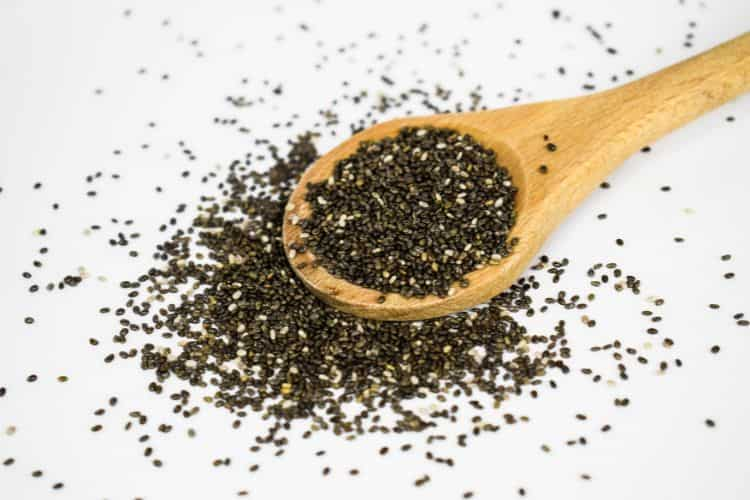
Chia seeds perfectly balance protein, healthy carbs, carbohydrates, and fiber. They also contain minerals necessary for a smooth transition to menopause: magnesium, calcium, phosphorus, and potassium.
Chia seeds are a good source of omega 3, a fatty acid that helps combat inflammation.
The seeds also contain tryptophan, which helps regulate serotonin levels. Serotonin is the brain’s “happy chemical,” and its levels can be disrupted during menopause.
Add chia seeds to your smoothies, oatmeal, and yogurt. Or, make an easy and tasty chia pudding.
Dark Chocolate

Dark chocolate is a great source of magnesium, which can help with various menopause symptoms.
For example, magnesium helps reduce anxiety and depression, both common issues.
In addition, some studies suggest that magnesium might reduce the frequency and severity of hot flashes. Furthermore, magnesium can help women fall asleep because it helps with muscle relaxation.
Dark chocolate can definitely help improve mood and boost energy levels. It is overall one of the better treats a woman can have.
Be sure to pick dark chocolate that contains at least 70% cocoa, as this provides the highest amount of magnesium. Pair a small piece of dark chocolate with berries or your fruit of choice to feel more satisfied and avoid overeating.
Kimchi

Kimchi is a fermented Korean dish made from cabbage, radish, or cucumber. It is high in vitamins A, B, and C.
Kimchi is also rich in probiotics, the good bacteria that help maintain intestinal health. This helps with digestion and reduces bloating—both common issues post-menopause.
Furthermore, probiotics help with overall gut health, which can improve symptoms like weight gain, insulin resistance, and decreased metabolism.
Serve kimchi as is, add it to tofu or udon noodles, next to eggs, or look for healthy Korean recipes.
Other sources of probiotics include kefir, sauerkraut, yogurt, and miso.
Get a full list of foods rich in probiotics here.
Green Tea
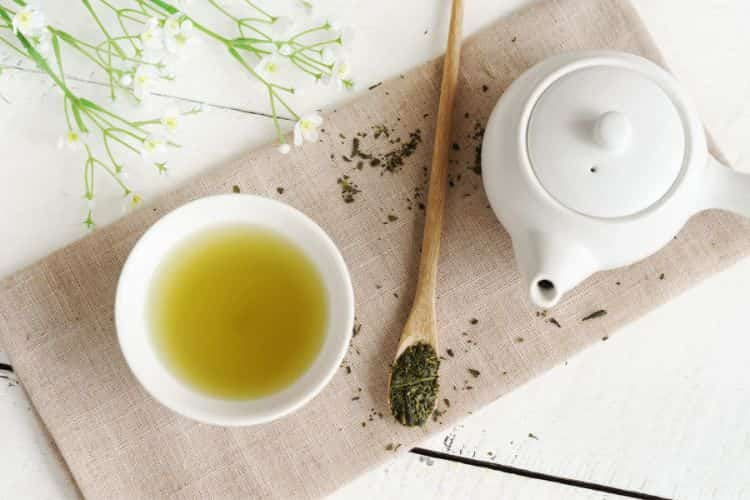
Green tea has been used to treat a variety of health issues for centuries. It is one of the best superfoods for menopause due to its high antioxidant content.
These antioxidants help reduce inflammation and flush out toxins in the body.
Also, some research points out the benefits of green tea in boosting metabolism.
Flaxseeds
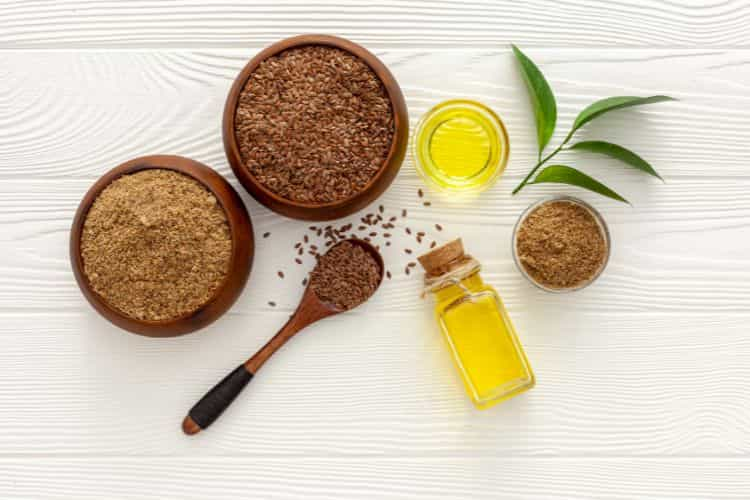
Flaxseeds are a plant-based source of omega-3 fatty acids, which can help reduce inflammation, balance hormone levels, and improve overall health.
Additionally, they contain lignans, phytoestrogens that might help reduce hot flashes and night sweats. However, while some studies support this theory, others do not.
Moreover, flaxseeds are a great source of probiotics, a key nutrient to a healthy gut. Not many know that menopause can negatively impact the gut, which results in an array of stomach issues.
Finally, flaxseeds may benefit bone health due to their high calcium, magnesium, and phosphorus content.
Add whole or ground flaxseeds to your salads, yogurts, smoothies, oatmeal, and cereal. Using flaxseed oil is also a great option.
Read more about the benefits of flaxseeds for menopause here.
Leafy Greens
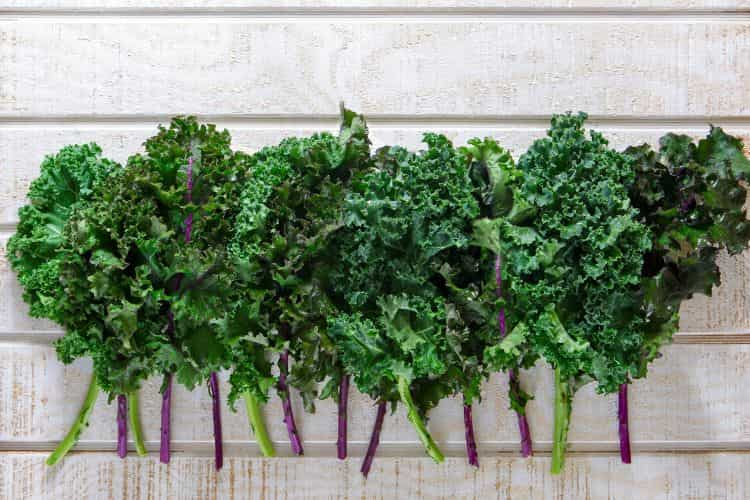
Leafy greens are an incredibly nutritious and beneficial food for menopause. They have been shown to help reduce inflammation, balance hormones, improve gut health, and even support bone health.
Leafy greens are a great source of fiber, magnesium, calcium, phosphorus, and potassium.
Eating leafy greens regularly is one of the best ways to ensure you get enough nutrition while going through menopause.
Beyond using greens for your salads, you can add them to frittatas, smoothies, and omelets. Or you can make crispy kale chips.
Salmon

Salmon is an incredibly nutritious food that can help reduce menopause symptoms. It is high in omega-3 fatty acids, which have been shown to reduce inflammation, balance hormones, and improve gut health.
Additionally, salmon contains high levels of vitamins D and B, which are essential for bone health. Eating salmon regularly can also help with reducing hot flashes and night sweats.
Try our ultimate anti-inflammatory salmon salad.
Turmeric
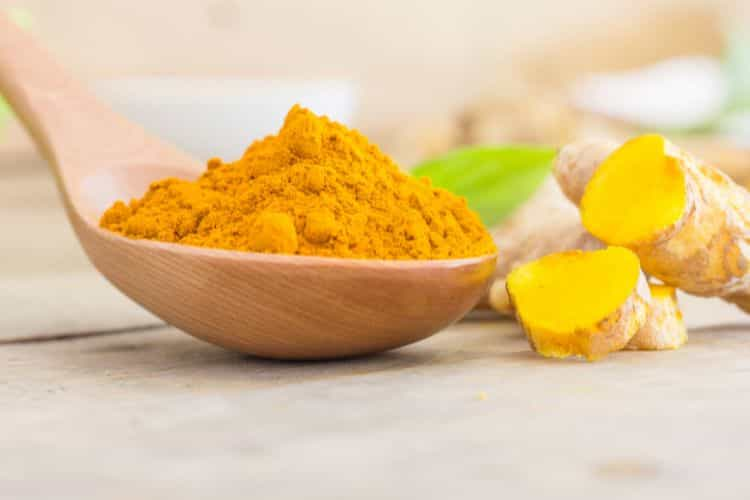
This ancient spice is truly amazing during menopause. Turmeric’s many benefits include:
- Reducing hot flashes
- Aiding weight loss
- Reducing inflammation
- Helping memory
- Improving circulation
- Fighting free radicals
- Improving gut health
Some ideas to add turmeric include wellness shots, turmeric oatmeal, golden milk, Indian dishes, and curry stir-fries.
Apple Cider Vinegar
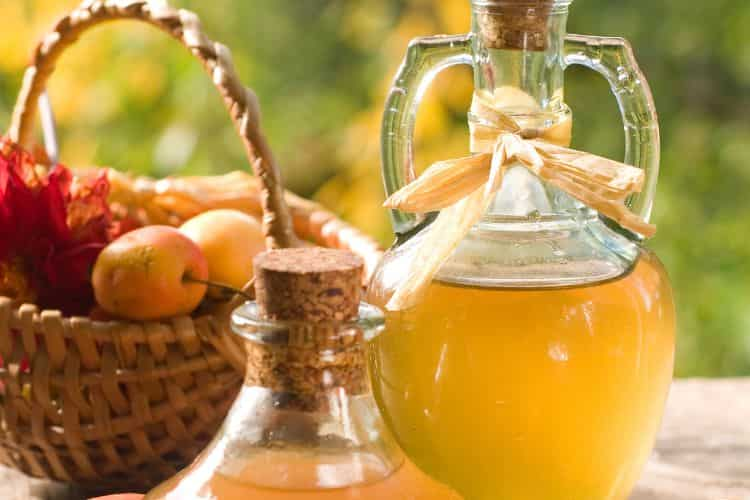
Apple cider vinegar is becoming increasingly popular for its many health benefits. It can help with digestion, weight loss, blood sugar, and even hot flashes.
Apple cider vinegar can be used in a variety of recipes to boost flavor and nutrition. It adds a tangy, sour flavor to salads, roasted vegetables, marinades, and even fruit-based dishes.
Maca Root
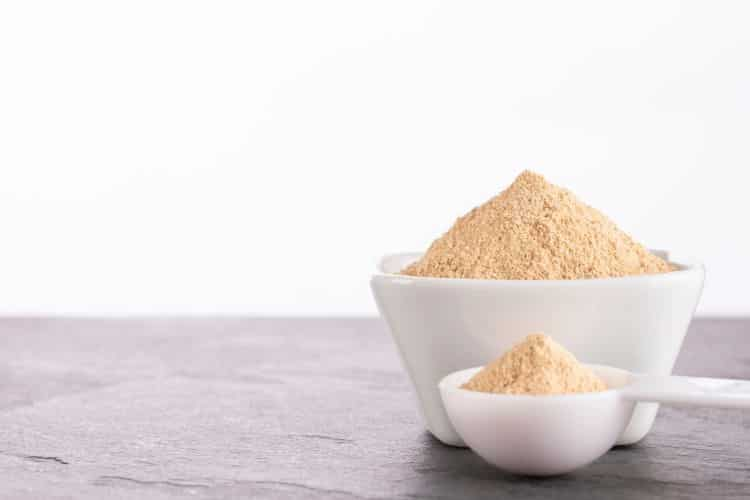
Maca root is another superfood that has been gaining popularity in recent years. It is an adaptogen, meaning it helps the body respond to stress.
Studies have uncovered maca’s benefits in reducing anxiety and depression, which are common in menopausal women.
Another intriguing perk of maca root is its ability to enhance sexual health.
Maca root is typically consumed as a powder and can be added to smoothies, hummus, and oatmeal. Learn more about maca for menopause here.
The Bottom Line
Menopause can be an uncomfortable and frustrating experience for many women, but it is possible to reduce symptoms with the right diet and lifestyle changes.
Incorporating foods such as flaxseeds, leafy greens, salmon, turmeric, apple cider vinegar, and maca into your daily routine may help alleviate some of the common issues associated with menopause.
Ultimately, each woman’s body is unique, so experimenting with different dietary options will likely yield positive results in finding what works best for you. Remember that eating a healthy balanced diet full of nutritious ingredients is key to managing menopausal symptoms— don’t forget to include plenty of fruits and vegetables!

Dr. Su-Nui Escobar, a Registered Dietitian/Nutritionist in Miami, FL, is dedicated to empowering women in perimenopause and menopause to live healthier, more satisfying lives.
With a doctorate in clinical nutrition from the University of North Florida, she has expertise in menopause and weight loss, including the unique challenges faced by those on weight loss medications.
Su-Nui’s passion for her field is evident in her previous role as the Academy of Nutrition and Dietetics spokesperson.


